BEST LITHIUM ION SOLAR BATTERY
As an important renewable energy, solar energy has incomparable innate advantages, both energy saving and emission reduction energy attributes. In addition, its easy to obtain, low cost characteristics make it become a new energy with great value of development and utilization, has been widely used. Since solar energy as a new energy came into public view, the utilization of solar energy battery has become the focus of people's attention, they are a typical way to use solar energy efficiently and convert it into electricity for storage.
Solar batteries, also known as "solar chips" or "photocells", in physics known as solar photovoltaic, is a photovoltaic semiconductor chip that uses sunlight to generate electricity directly. It only needs to be hit by light that meets certain lighting conditions. Instantaneous output voltage and current generation in the case of a loop.The battery used in the solar system requires a strong discharge current and a long battery life. The former can ensure the smooth operation of the golf cart, and the latter determines the use time.
With the improvement of living standards, more people will employ solar energy. Then it is very important to choose a lithium battery that suits for your home energy storage system. It is very important for golf carts to use matching batteries, just like using professional RV batteries for RVs. Below, you will have more choices of lithium batteries. Quickly choose a battery that fits your solar system.
HOT PRODUCTS
Tycorun lithium ion solar batteryMORE APPLICATION SCENARIOS
Tycorun lithium batteryLITHIUM BATTERY ADVANTAGE
●Bolted Cells for increased strength and better conductivity
●Built In Fully Automatic Battery Management System
●Explosion proof stainless steel cells - Built in Thermal Fuse
●Flame Retardant Electrolyte
●3.2V LiFePO4 Smart Cells
●High Pressure Safety VentOver voltage and under voltage protection
●Reverse polarity and short circuit protection Automatic Cell Balancing
●Safe - LiFePO4 Lithium Iron Phosphate Chemistry
●Replaces any lead acid, gel or AGM batteries
●ZERO Maintenance Limited Lifetime Warranty
TYCORUN 12V100AH SQUARE BATTERIES
CHALLENGE YOUR LIMITS WITH TYCORUN LITHIUM BATTERIES!
Shop our large selection of products and purchase online today + enjoy free shipping!- 12v Lithium Battery
- 24v Lithium Battery
- 36v Lithium Battery
- 48v Lithium Battery
- Lithium Forklift Batteries
- Lithium Golf Cart Batteries
- Motorcycle Lithium Batteries
- Telecom Lithium Batteries
- UPS Lithium Batteries
- Drone Lithium Battery
- Lipo Battery
- Medical Lithium Battery
- Mobility Scooter Lithium Batteries
- Lithium Deep Cycle Travel Trailer Battery
- Lithium Deep Cycle Marine Battery
- Lithium Fish Finder Battery Pack
- lithium kayak battery pack
- Lithium Lawnmower Battery
- Deep Cycle Lithium Camper Battery
- Lithium Deep Cycle Trolling Motor Battery
- Lithium Ion Deep Cycle Rv Battery
- Off Grid Solar System Storage Batteries
- Drone Battery
- Lipo-battery
- Medical battery
- Mobility Scooter Batteries
An elaborate guidance of lithium ion solar battery- FAQs and uses
Main content:
- What is a lithium ion solar battery?
- Is lithium ion battery good for solar?Are lithium ion solar batteries the best energy storage option?
- Which solar batteries last longest?How long does a lithium ion solar battery last?
- What is the advantage and disadvantage of lithium ion solar batteries?
- Lithium ion solar battery FAQs
- What is the best lithium ion solar battery?How do I choose a lithium ion solar battery?
- How do lithium-ion solar batteries work?
- What are the application scenarios of lithium ion solar batteries?
- What are the types of lithium-ion solar cells?
- What is the specification of lithium-ion solar cells?
- How many lithium ion solar batteries are needed to power a house?How long can a lithium ion solar battery power a house?
- What are the safety demand to use lithium-ion battery with solar power system?
- How much does a lithium ion solar battery cost?Are lithium solar batteries worth it?
- Bottom line
In the fast-paced world of endless innovations in tech and widespread digitalization of ways of doing things, energy has been the key to nearly everything. For centuries, the human race has relied upon fossil fuels for all kinds of power. From lighting our homes to powering our cars and other appliances, everything has always been about fossil fuels. But with the recent outcry about climatic change and saving our planet, everybody now realizes the urgent need to change the way we generate our power. And that answer lies with sustainable energy—the solar system in particular, which is the optimal choice for home energy storage.
The solar revolution has been on for decades. Solar power has been and is still providing cutting edge solutions to the energy requirement of people from different continents and races. However, one of its big challenges has been that it is widely received as an intermittent power source. The sun is not shining always. Luckily, the question is now addressed by the new energy storage technologies championed by lithium battery technology. If you want to go completely off the grid, lithium ion solar battery will help you achieve this dream. This battery offers many advantages over regular tubular lead acid battery. However, what is the best solar battery? Which solar batteries last longest? Are lithium-ion solar batteries the best energy storage option?
1.What is a lithium ion solar battery?
To better understand what a lithium ion solar battery is, maybe we should start by understanding what lithium batteries are all about. Lithium-ion batteries are rechargeable batteries with carbonic acid esters organic solvents and LiPF as the electrolyte. The cathode material of Li- ion batteries is mainly lithium cobalt acid, lithium manganese acid, lithium iron phosphate, lithium nickel acid, lithium nickel cobalt manganese acid and other active materials, and the anode active material is usually graphite, lithium titanate or carbon material similar to graphite structure. During charging and discharging, lithium ions are embedded and de-embedded back and forth between the two electrodes. When charging, lithium ions are removed from the cathode and embedded into the anode through the electrolyte, which is in a lithium-rich state, while the opposite is true when discharging.
So back to the question, what is a lithium ion solar battery? Lithium-ion solar batteries are like every other lithium-ion battery, but this time around, they are specially designed to pair with a solar system and store excess solar energy for later use. This rechargeable battery helps maintain a balance between power generation from the solar system and the demand by the consumer. Lithium-ion solar batteries are widely used for home energy storage, such as Powerwall battery, which was first launched in 2015 by Tesla.
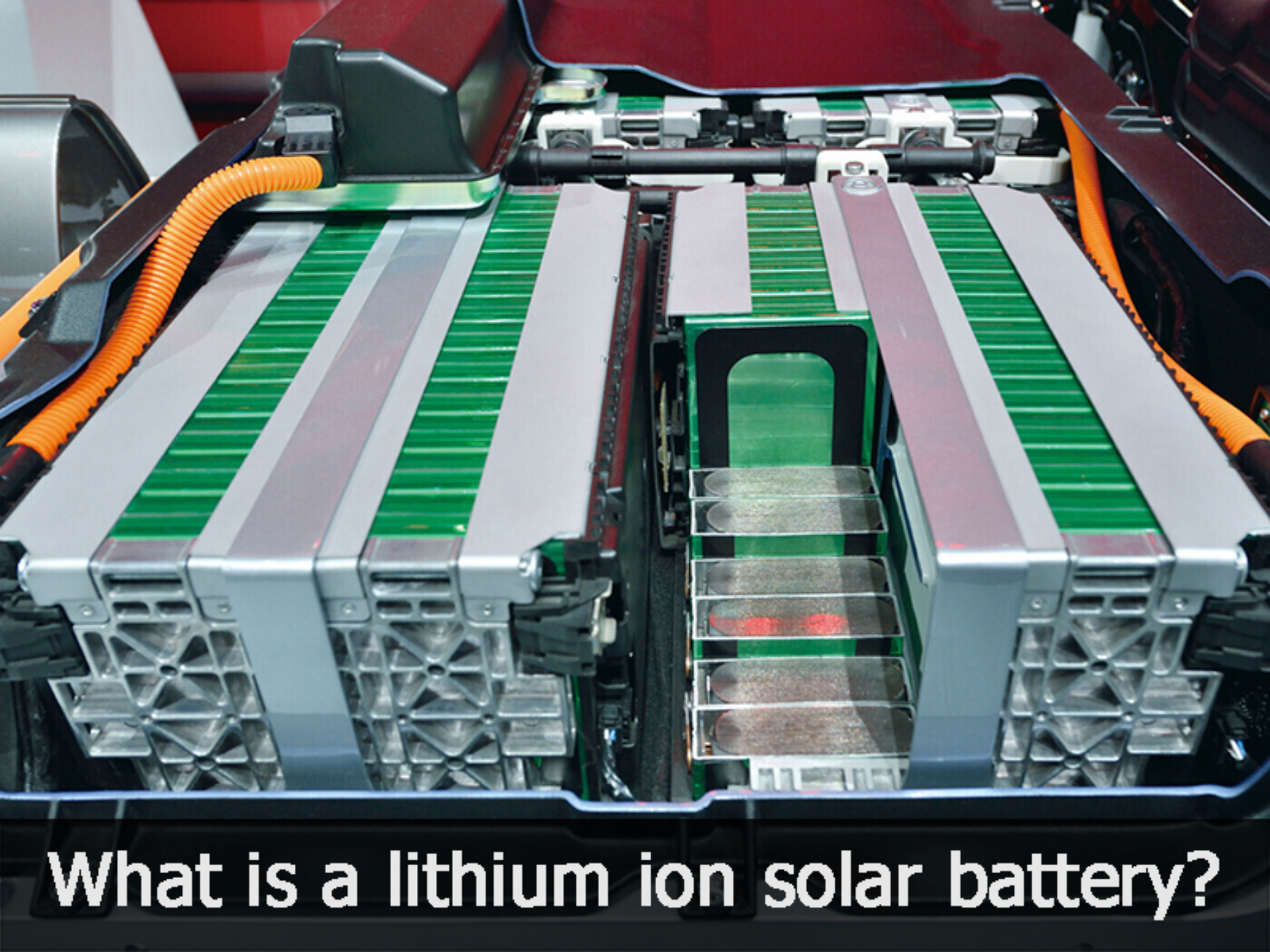
The lithium ion solar battery, Powerwall , promoted interest in home energy lithium-ion solar batteries. The success of Powerwall about seven years ago also created hope of making an affordable solar battery technology for residential purposes, building on the lithium ion solar battery technology. Before the first lithium ion solar battery, most solar systems used lead-acid batteries. But with the advent of the more efficient lithium ion solar battery, it is clear that we will be seeing more lithium-ion solar batteries and fewer lead-acid batteries. But then, are lithium-ion solar batteries good for solar panel systems?
2.Is lithium ion battery good for solar?Are lithium ion solar batteries the best energy storage option?
Right after the success of the Powerwall, lithium-ion batteries quickly move to the top of the solar battery food chain. Lithium-ion batteries have more cycles than lead-acid batteries. Lithium-ion battery's ability to save energy makes it a strong battery option for solar systems. They are lightweight, maintenance-free, offer a long lifespan, and low self-discharge.
Whether you plan to use your solar system every day or occasionally, you don't have to worry about your solar battery losing superabundant capacity as it idles away as long as you're using a lithium-ion battery for your solar system. While lithium-ion batteries are more expensive than lead-acid batteries, they are more cost-effective in the long run as they eliminate maintenance costs and have a longer cycle life. If you want to power your home with solar energy 24/7, a lithium-ion battery is your best bet.
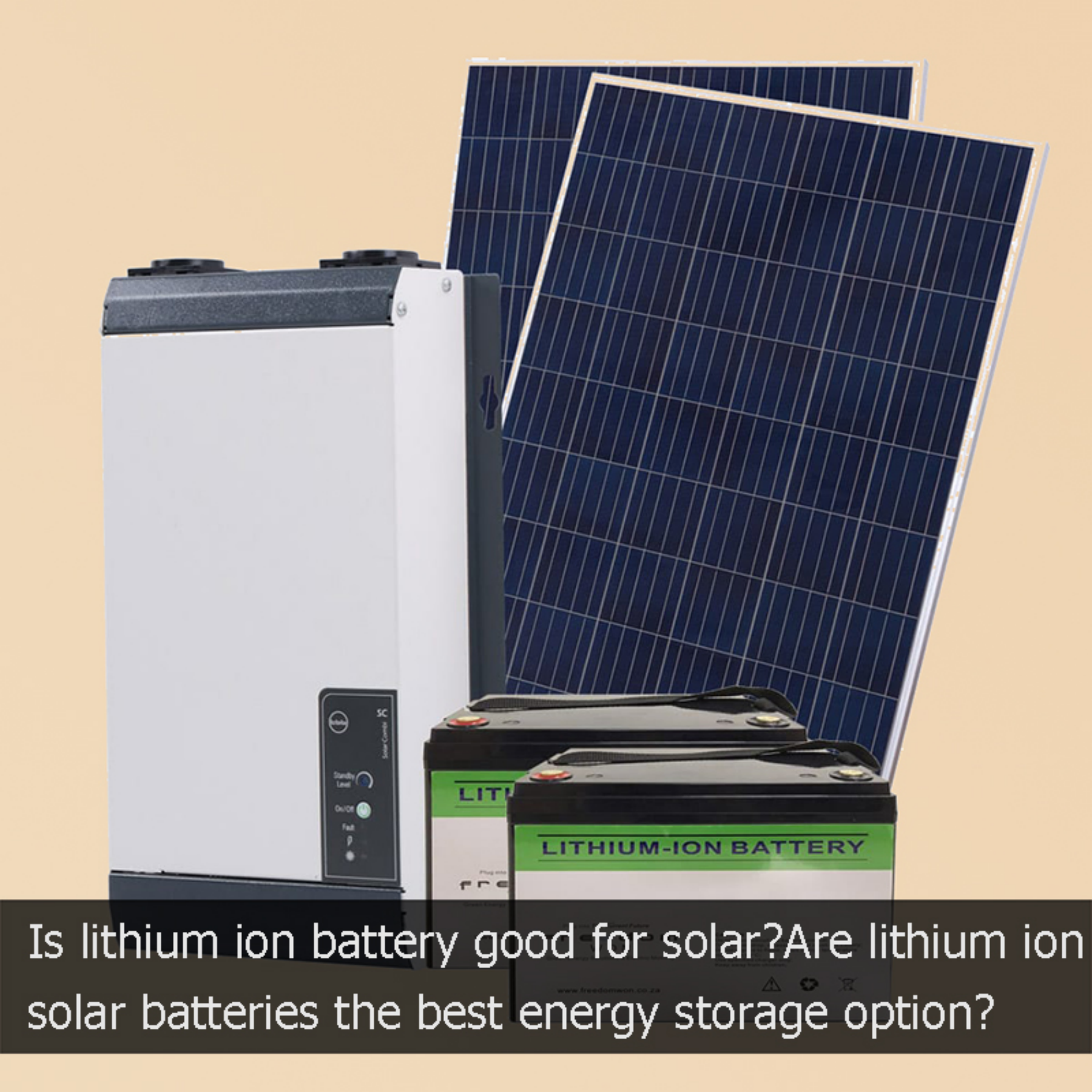
There are many solar battery options out there. Still, none comes close to lithium-ion solar batteries when it comes to efficiency. The higher efficiency rating of your lithium-ion battery means that you get to use more of the energy that your solar system produces and stored in the batteries. Lithium-ion batteries can provide you up to 95% efficiency compared to other battery options. However, this is apparently not the only reason lithium-ion solar cells are gaining popularity.
Besides being more efficient than other solar cells, lithium-ion solar cells are smaller and lighter thanks to their high energy density, saving time and effort in installing them. In addition, lithium-ion batteries do not contain heavy metal pollution, so they are far more environmentally friendly than lead-acid batteries.The long cycle life of lithium-ion batteries is also a significant advantage over other batteries. To sum up, the performance of lithium battery in all aspects is obviously better than other batteries, they will be your best energy storage option.
3.Which solar batteries last longest?How long does a lithium ion solar battery last?
Solar batteries are a huge investment you'd be making for your residential energy purposes. If you want to stick with sustainable energy permanently, solar batteries can help you store excess energy, which you can use at night or on cloudy days. However, making the best out of your solar system depends heavily on the solar battery you choose to use. Generally, solar batteries have a lifespan of five to 15 years. However, how long a solar battery will last you depends on: how often you use the battery, the battery environment, the battery type and condition of loading.
One way to determine how long a solar battery will last is to pay attention to its depth of discharge (DOD). Your solar battery's DOD tells you the percentage of its stored energy to use. The higher the battery's DOD, the longer it will last you. However, Using your battery below its common DOD will shorten the lifespan of your solar battery. There are three major types of solar batteries—the lead-acid solar battery, lithium ion solar battery, and saltwater solar battery. These batteries offer different storage capacities and cycle life. Out of the options, lithium-ion batteries last the longest.
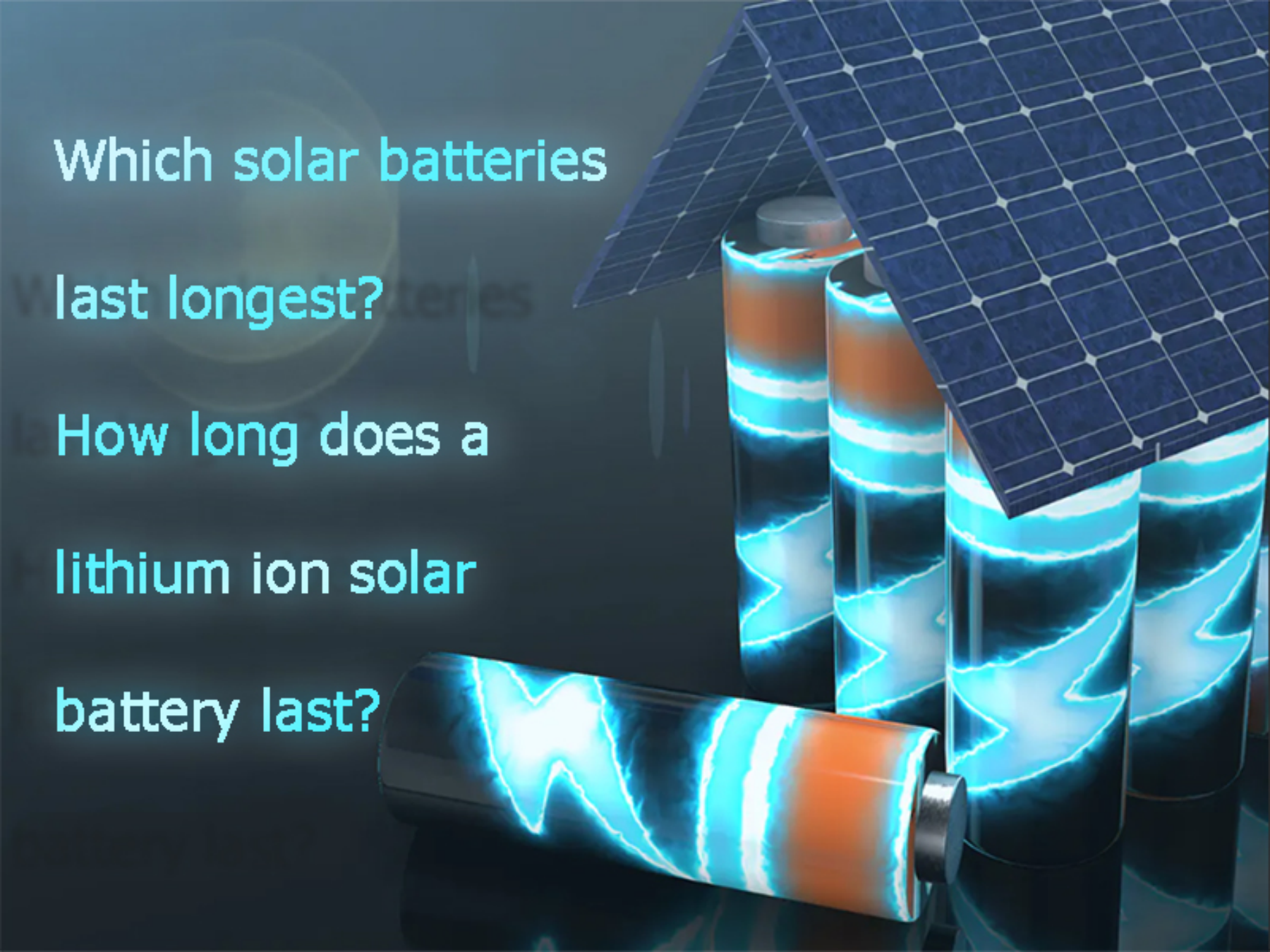
The cheaper alternative, the lead-acid battery, they offer fewer cycles and one of the weakest lifespans in solar battery technology. Using such batteries, you can only utilize a portion of the energy stored in the battery. Lead-acid batteries may be a more cost-effective option, but when you consider that their lifespan will force you to change the battery continually, you'll quickly discover that going with the lithium-ion battery is your best bet. Finally, saltwater batteries are relatively new to the solar battery race. This battery technology uses salt instead of corrosive materials in storing and discharging energy. They are much safe and easy to use. Compared to lead-acid batteries, saltwater batteries lasts longer but fall below lithium-ion batteries.
When it comes to solar batteries for home solar systems, lithium-ion batteries are the best. They offer a longer lifespan and more energy. The DOD is the ratio of actual capacity to nominal capacity. Therefore, when purchasing batteries, we should pay attention to the actual DOD of batteries. The DOD of a normal brand new lithium ion battery should be 100%, and when the DOD becomes 80% after long-term use, the battery can be considered as discarded or used in steps.
Therefore, the number of cycles of a cell should be defined as the number of cycles available before DOD drops to 80%. While lead-acid batteries can last you for 5 years, lithium-ion batteries have up to 4,000 cycles when the DOD is 80% and can last for 10 years if charged and discharged on average once a day (4000/365≈10.96). With this battery's long shelf life and high DOD, you don't have to worry about your solar power going off quick.
4.What is the advantage and disadvantage of lithium ion solar batteries?
① Advantages of lithium-ion solar batteries
Great efficiency Maintenance-free Optimum Capacity Compact and lightweight Zero Voltage sag Environmental friendliness Longer lifespan
② Disadvantages of lithium-ion solar batteries
costly (more than other options) Prone to thermal runaway Although one of the big disadvantages of lithium-ion batteries lies in their high price tag, with the ever-increasing demand and more tech revolutions in battery technology, we will undoubtedly be seeing a more affordable lithium ion solar battery soon. However, the problem of thermal runaway can be solved because of the presence of BMS, which can be used for thermal management and overheating protection.
5.Lithium ion solar battery FAQs
① What is the best lithium ion solar battery?How do I choose a lithium ion solar battery?
If you're shopping for a lithium ion solar battery, there are many options out there for you to pick from. The best lithium-ion battery for your solar system depends on your energy needs. If you want to get the best lithium ion solar battery, there are many factors you need to consider. Since it's already a lithium battery, you don't have to worry about the battery type, but you may want to check out the battery voltage capacity, lifespan, duration, and possible warranty, load requirement, solar panel specification, installation location and size, electricity demand, etc.

② How do lithium-ion solar batteries work?
Lithium-ion solar batteries allow your solar system to store excess energy generated during the day or sunny period. Your solar panels often generate energy during the day, when the sun is at its peak. Most times, you may not be at home to consume this energy. Sometimes, it could be that your panels are generating more energy than you need. In either of these scenarios, instead of abandoning these energy, your lithium ion solar battery will store this excess energy. Later at night or on cloudy days, your battery will make these energy available for your consumption.
③ What are the application scenarios of lithium ion solar batteries?
Lithium-ion solar batteries can be used at solar power stations. It can also apply in industries or homes that use a solar systems and RVs.
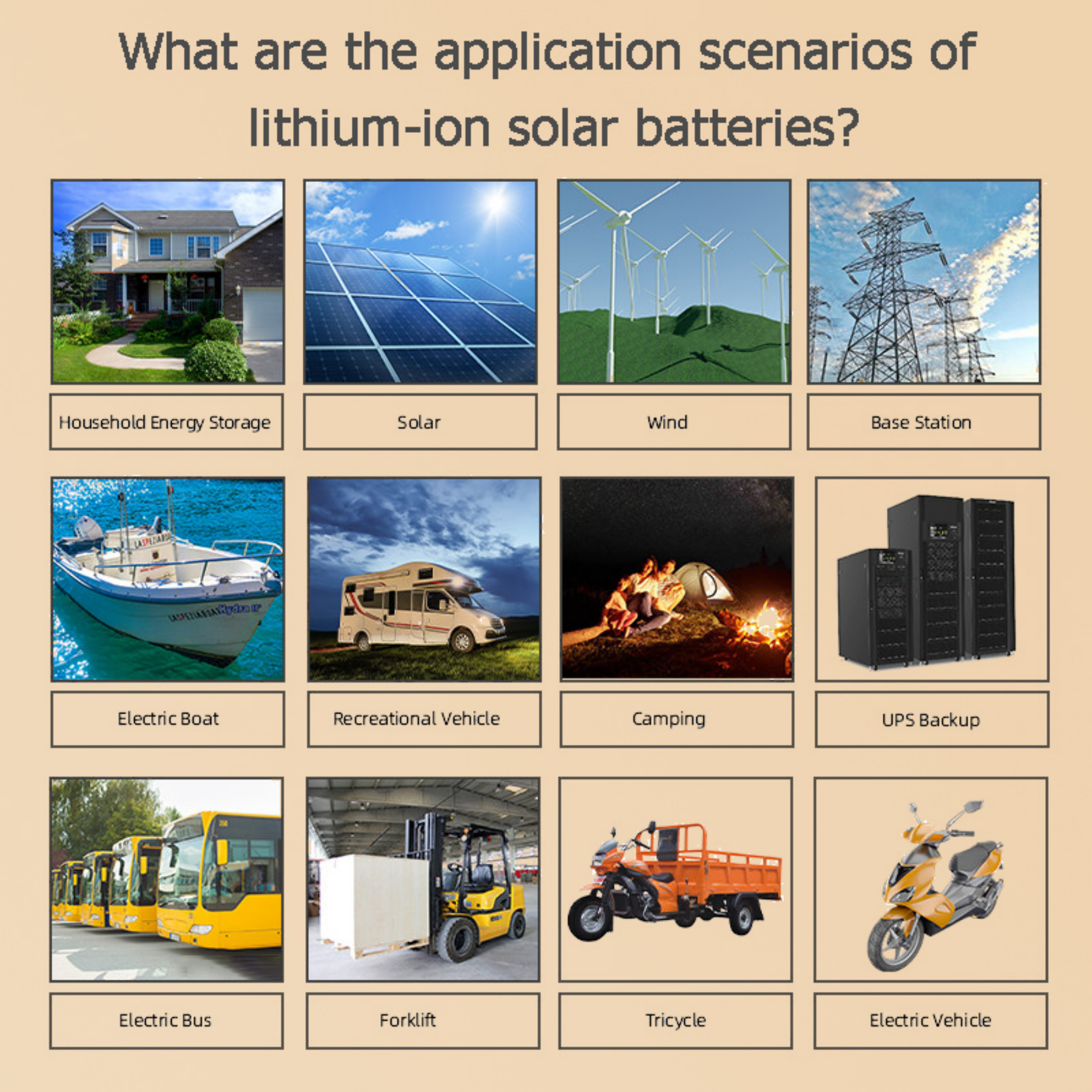
④ What are the types of lithium-ion solar cells?
Generally, three cell types are used in lithium-ion batteries; cylindrical, prismatic, and pouch cells. However, the major types of lithium-ion used for solar batteries include Lithium Manganese Oxide (LMO) Lithium Nickel Manganese Cobalt Oxide (NMC) Lithium Nickel Cobalt Aluminum Oxide (NCA) Lithium Iron Phosphate (LFP).
⑤ What is the specification of lithium-ion solar cells?
Battery specification, also known as battery ratings, tells you everything you need to know about the battery. When shopping for a lithium-ion battery cell for your home, always make sure you go for the option that meets your household needs. The best lithium ion solar battery, the Tycorun wall mounted lithium battery, comes with a storage capacity of 5 kWh/10kWh/12kWh.
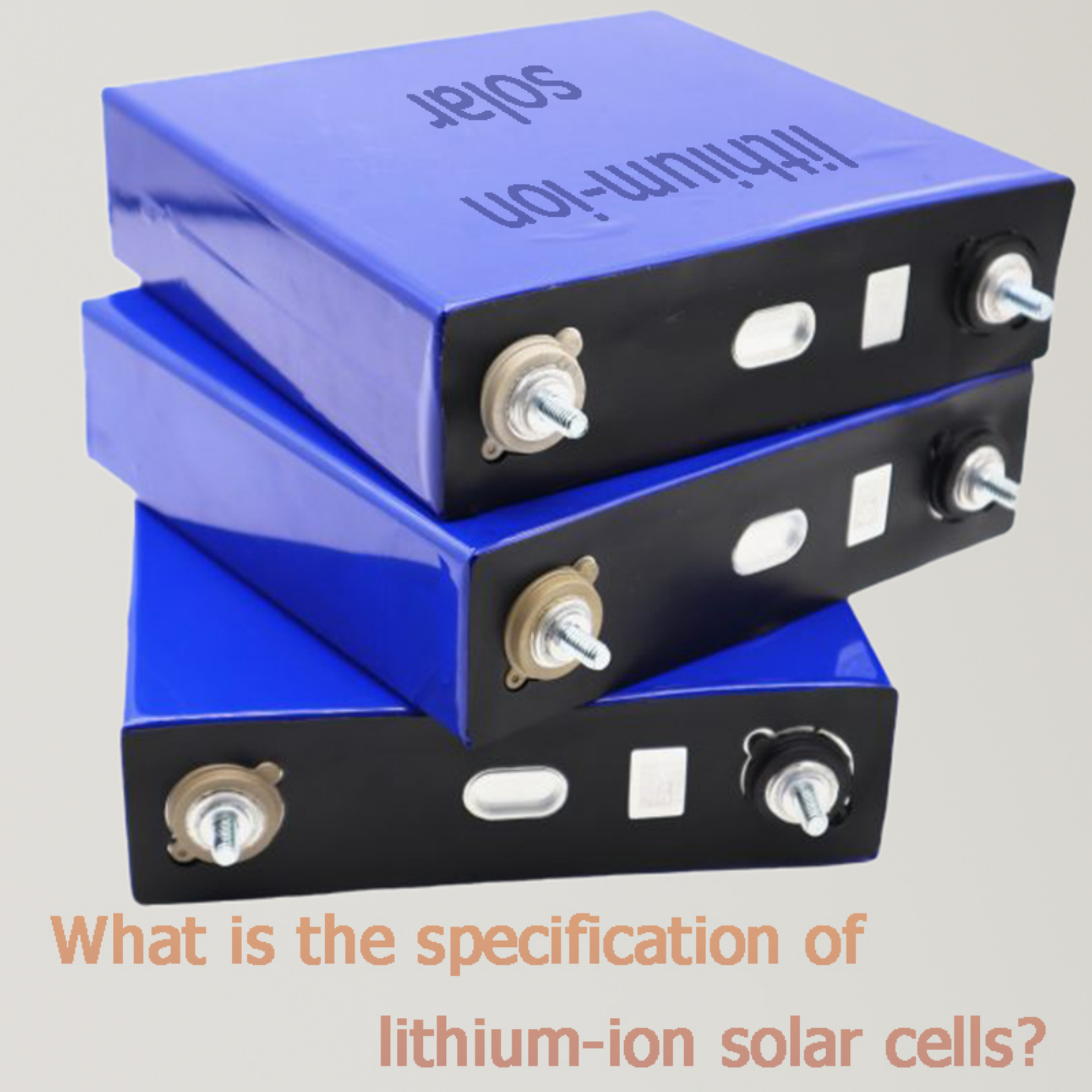
⑥ How many lithium ion solar batteries are needed to power a house?How long can a lithium ion solar battery power a house?
Finding out how many batteries you need for your home depends on your home's energy needs and how reliable your panels are. You can ask the battery company staff to help you with your current monthly estimate. However, some homes may need more than two lithium-ion solar batteries. Your solar battery capacity is measured in Ampere-Hours (Ah), while the rate it transfers energy is in Volts (V).
To determine your energy use (measured in Watt-Hours) with respect to your battery capacity, multiply your battery's capacity by its voltage. For instance, if your battery's spec reads 12V 200 Ah, it means that the battery has a power of 2400Wh.. If your home needs 1,200 watts an hour, the battery provides about 2 hours of power. The length of time a lithium-ion solar cell can be powered depends on its capacity, the number of batteries you have installed and the energy consumption of the load.
⑦ What are the safety demand to use lithium-ion battery with solar power system?
Lithium-ion batteries are generally safe to use. The risk of fire while using these batteries is mostly a result of poor installation practices and improper uses. When installing and using a lithium ion solar battery, always follow the manufacturer's guidelines to the core.

⑧ How much does a lithium ion solar battery cost?Are lithium solar batteries worth it?
Lithium-ion solar batteries start from $7,000. Of course, this does not include the cost of installation. The actual cost of your lithium ion solar battery system can be influenced by the battery's brand, the number of batteries you need, and the price of its installation. Lithium-ion solar batteries are easily the best batteries you can apply to your home solar system. They are more efficient, last longer, take up little space, and store a high amount of energy. Although they may be pricey, they offer the best value for your money.
6.Bottom line
Energy storage has been making waves. Solar batteries now bear the solution to all our power consumption needs, thanks in part to lithium-ion solar batteries. With the rise of lithium-ion solar batteries, there's a gleam of hope that more than half of the world will be powered by sustainable energy in the nearest future. Again, all thanks to lithium ion solar battery technology.

